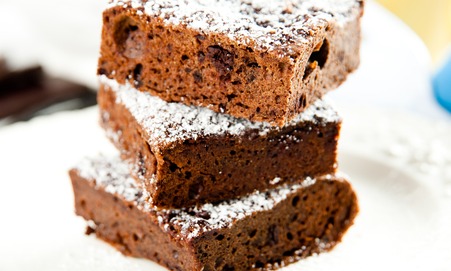This month, I celebrated my gluten-free bat mitzvah. That sentence needs a bit of clarification: no, I’m not becoming a bat mitzvah nor am I becoming a bat mitzvah and then celebrating with a party that is catered to be gluten-free. I became a bat mitzvah when I was 13, in 1999. And yes, if you’re wondering, I recognize my bat mitzvah anniversary each year—I’m still really proud of that day.
What I’m actually referring to is that this month marks thirteen years since I was diagnosed with celiac disease and began a gluten-free diet. Just as I once turned 13 and became a bat mitzvah, now I’m turning 13 in gluten-free years.
I figured I would buy a gluten-free cupcake on the actual day, text a few people that it was my “gluten-free bat mitzvah,” and that would be that. But upon further reflection, I realized I was actually doing more than just marking a numerical rite of passage. The truth is, there’s a deep connection between my actual bat mitzvah and my diagnosis of Celiac. I was diagnosed about nine months after my bat mitzvah, and the fact that I’m now marking that important moment in my adolescence in a similar manner is meaningful. It’s beyond the number thirteen.
Nine months after I came of age in my community and was asked to take responsibility for myself, I suddenly had to take responsibility for my health. No one was going to do it for me, I was old enough that I had to do it for myself. I was not diagnosed as a toddler or child, an age at which adults would have had to monitor me. Instead, I was a teenager and in my religious community, I was already considered an adult. It was up to me. I would have to learn how to be on a gluten-free diet.
So, at almost 14, right before high school started, I began a strict gluten-free diet. I learned which foods were and were not gluten-free. I learned about cross-contamination, a big issue for those on gluten-free diets. A french fry may start out gluten-free, but once it falls in a fryer with onion rings it’s no longer gluten-free. I tried every gluten-free product out there and stuck with the ones I liked. Most importantly, I learned—and still continue to learn—how to be an advocate for myself.
I cannot expect a waiter at a restaurant to read my mind or the host of a dinner party to remember my restrictions. I have to ask questions about the menu and how foods are prepared to see, first, if a gluten-free meal is possible and, if so, which items are best for me. If I’m traveling, I have to make a plan. I’m not perfect. Sometimes I’m not the best advocate, but I always try and do better the next time.
My first major responsibility after my bat mitzvah has now been a responsibility for thirteen years. As an adult, the diet is now just one of many responsibilities, but it remains an important one, and one that I’ve learned a great deal from. Maybe that’s why I began to feel so strongly about my “gluten-free bat mitzvah.”
Responsibility and all that it entails was first bestowed upon me as a bat mitzvah. I then put those notions into practice with the gluten-free diet, and I’m still learning how to apply them when a question or a problem arises and I have to handle it. I have to make the decision to protect what is important to me and speak up when it’s right—a lesson I also learned upon becoming a bat mitzvah.
My “gluten-free bat mitzvah” may have started out as a lighthearted way to mark a milestone, but it ended up being much more emotionally significant than I could have realized. In a way, I came full circle.
Previous: The Best Gluten-Free Passover Products










Te Irak’taki Koço köyünde gece güzel başlamış, köylüler muhtarın evinde düğün için toplanmıştı.
Düğüne gelen genç kızlar, gecenin sonunda başlarına.
This menu’s updates are based on your activity.
The data is only saved locally (on your computer) and never transferred to us.
You can click these links to clear your history
or disable it.